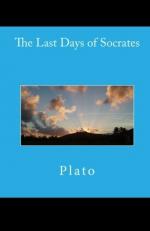
|
| Name: _________________________ | Period: ___________________ |
This test consists of 15 multiple choice questions and 5 short answer questions.
Multiple Choice Questions
1. Socrates claimed that he was questioning Euthyphro for what reason?
(a) Because he wanted Euthyphro to see the error of his decision.
(b) Because he wanted Euthyphro to make the best decision for his circumstances.
(c) Because he wanted to learn from Euthyphro.
(d) Because he just wanted to have an intellectual debate.
2. What does the term "epistemology" mean, in philosophy?
(a) Using logic to prove an argument.
(b) The love of knowledge.
(c) The problem of knowledge, and how to acquire it.
(d) Proving the inconsistency of another's argument.
3. At the end of his dialogue with Euthyphro, how did Socrates define "holy" actions?
(a) Actions that do not break any man-made laws.
(b) Actions that were once performed by the gods themselves.
(c) Actions that meet with the gods' approval.
(d) Actions that meet with the approval of those appointed by the gods as their representatives on earth.
4. According to the conversation between Euthyphro and Socrates, what was the relationship between deities and mortals?
(a) The gods would not exist without men.
(b) The gods need men to give them a purpose.
(c) The gods and mortals had a mutual relationship.
(d) Men were at the mercy of the gods.
5. Thrasyllus was a scholar from what century?
(a) 2nd century C.E.
(b) 1st century C.E.
(c) 1st century B.C.E.
(d) 3rd century C.E.
6. Who was prosecuting Socrates?
(a) Crito.
(b) Phaedo.
(c) Meletus.
(d) Euthyphro.
7. Where was Socrates being prosecuted?
(a) Athens.
(b) Thrace.
(c) Lyceum.
(d) Sparta.
8. Where was the battle that Socrates miraculously survived?
(a) Thrace.
(b) Sparta.
(c) Athens.
(d) Lyceum.
9. Euthyphro was prosecuting someone for what crime?
(a) Blasphemy.
(b) Murder.
(c) Adultery.
(d) Larceny.
10. How many people were jurors at Socrates' trial?
(a) 12.
(b) 25.
(c) About 500.
(d) About 250.
11. During "The Apology," what does Socrates say about politicians and poets?
(a) He was able to learn a lot from them.
(b) They are generally more intelligent than average laborers.
(c) It was difficult to converse with them because they talked in circles.
(d) They usually pretend to have knowledge that, in reality, they lack.
12. What celestial body is associated with Artemis?
(a) The sun.
(b) Neptune.
(c) The moon.
(d) Pluto.
13. What does "apology" mean, in the context of the dialogue of that name?
(a) A plea to the jury for forgiveness.
(b) An explanation for one's behavior.
(c) Socrates' entire defense at his trial.
(d) The same as its modern definition.
14. What happened at the end of the dialogue between Euthyphro and Socrates?
(a) Socrates became frustrated that he couldn't get through to Euthyphro.
(b) Despite wanting to continue the discussion, Socrates was called to trial.
(c) They unearthed a circular argument, and Euthyphro ended the discussion.
(d) Euthyphro was unsettled and didn't want to talk to Socrates anymore.
15. How many charges were being leveled against Socrates?
(a) Eight.
(b) Six.
(c) Four.
(d) Two.
Short Answer Questions
1. How did Grecian authors use Socrates' character?
2. Who went to see the Apollonian Oracle at Delphi?
3. To what Athenian god did Euthyphro refer as an example to back up his decision?
4. Who provides the information contained in the notes of Book 1, Chapter 1?
5. Who was Xenophon?
|
This section contains 543 words (approx. 2 pages at 300 words per page) |

|




